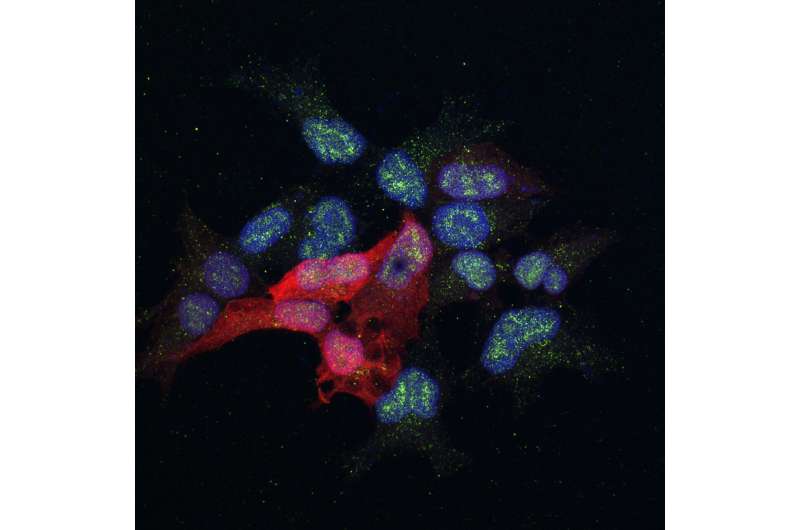This article has been reviewed according to Science X's editorial process and policies. Editors have highlighted the following attributes while ensuring the content's credibility:
fact-checked
peer-reviewed publication
trusted source
proofread
Researchers decipher the mechanism by which the MAF protein promotes breast cancer metastasis

Breast cancer is the most common form of cancer among women, with more than 2 million new cases diagnosed each year. In cases where the tumor remains localized in the breast, survival rates are remarkably high, at around 90%. However, the spread of cancer cells beyond breast tissue and the formation of metastases in other organs dramatically worsens the prognosis and poses significant challenges.
Previous research has already linked the MAF protein to an increased risk of developing metastasis, but the reasons for this connection remained unclear.
A team from IRB Barcelona led by ICREA researcher Dr. Roger Gomis has revealed the mechanism by which the MAF protein increases the risk of metastasis in breast cancer patients. This finding is a crucial step in understanding the molecular basis of metastasis and has relevant clinical implications for treatment.
The research team has detailed in the journal Nature Cell Biology how the MAF protein interacts with the estrogen receptor, a key element in the development of breast cancer, modifying its structure. This interaction leads to DNA restructuring, which allows the activation of genes that favor metastasis, particularly in response to estrogen. These findings imply that patients with high levels of MAF protein have a greater risk of developing metastasis.
This study opens up the possibility of preventing metastasis by impeding the activation of pro-metastatic through the inhibition of the KDM1A molecule, which is responsible for DNA restructuring. This offers new perspectives in the treatment of breast cancer. The study was carried out in cultured cells and animal models of the disease, and it was validated in patient samples.
Crucial discovery for young and premenopausal patients
Previous studies by the same laboratory had already established a connection between increased MAF protein levels and resistance to "bisphosphonate" treatment used to prevent breast cancer metastasis to bone.
The detection of high levels of MAF can therefore predict the risk of metastasis, as well as distinguish between breast cancer patients who may benefit from bisphosphonate treatment from those for whom this treatment is inappropriate. This information is particularly crucial for young patients. Treatments aimed at the site of bone metastasis can, in some cases, divert metastasis to other organs, which has a negative impact on the overall survival of patients.
"This finding is a critical step in understanding how breast cancer spreads and opens up new therapeutic options for the 20% of patients who cannot benefit from bisphosphonate treatment," explains Dr. Gomis, head of the Growth Control and Cancer Metastasis laboratory at IRB Barcelona and also a group leader at the Cancer CIBER (CIBERONC).
The MAF test: A diagnostic tool that is now available
The research carried out in Dr. Gomis' lab has led to the development of the MAF Test, a predictive tool available for breast cancer patients. This diagnostic test has been developed by Inbiomotion, a spin-off from IRB Barcelona and ICREA founded in 2011, and is available in Spain through PALEX Medical.
The MAF Test allows the identification of breast cancer patients with a greater risk of developing metastasis and facilitates informed decisions by oncologists about the most appropriate treatment for each case.
An inhibitor of the element that researchers have identified as key in the metastatic drift of breast cancer, namely the KDM1A protein, has already been identified and is currently in clinical trials to validate its effectiveness and safety. This inhibitor and related trials are independent of the findings published today. However, if this potential drug is confirmed to be effective, it could offer significant benefits for patients with elevated MAF levels by helping to prevent the development of metastases.
More information: Roger Gomis et al, MAF amplification licenses ER through epigenetic remodeling to drive breast cancer metastasis,Nature Cell Biology (2023). DOI: 10.1038/s41556-023-01281-y




















